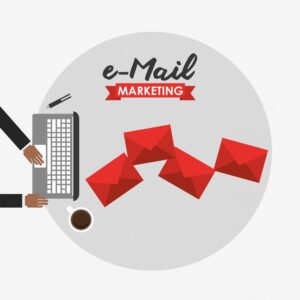
Email marketing means sending emails to current and potential customers to promote any business offer. This digital marketing technique is also used to engage existing customers and attract new ones. Effective emails have important content, personal context, insight, a clear call to action, etc. Thus, this campaign conveys the product’s story by promoting updates, offers, events, and content.
What is Email marketing?
In email marketing, companies create personalized email campaigns that are sent to a specific list of customers who have purchased or requested to receive these emails. To increase its customer base, the company may also purchase additional email lists for people interested in its products.
To gain credibility and potentially increase sales, every email marketing campaign should be carefully crafted with relevant topics and content that meets the recipient’s specific needs and interests. Metrics such as open rate, link click-through rate, and conversion to impactful results such as purchases can be used to measure the effectiveness of a marketing email.
Types of Email Marketing
Marketers have many options for communicating with customers via email. But some types of email Marketing can help your company more than others, such as:
- Promotional emails: These emails focus on special promotions, discounts, new products, or other marketing campaigns to encourage purchases and business. For example, email coupons, email sale announcements, or product launch emails. They support the industry’s latest promotions.
- Newsletters: regular, recurring email newsletters that provide customers with new and updated information, such as newsletters, company news, blog content, tips, or other important information. Their goal is not to sell products directly but to create partnerships.
- Welcome Email: The welcome email is one of the most important emails to send. They are the first email contact when a customer signs up and set the tone for the customer relationship. A well-designed welcome email represents the business, highlights the benefits of the subscription, and also initiates customer interaction.
- Cart abandonment emails: When customers add items to their online shopping cart but do not complete the purchase, cart abandonment emails remind them to return and complete the checkout. These email marketing campaigns can help re-sell lost customers who need extra support with the purchase.
- Customer reactivity emails: These emails target customers who have been inactive for a while and try to re-engage them and encourage them to get back to business. Ideas might include sending out promotional codes, linking to new content, or showcasing recently sold products.
- Drip opt-in campaigns: These campaigns incentivize new users by sending them valuable content in the first thirty, sixty, or ninety days. The Getting Started section covers topics like FAQs, product information, sizing instructions, community user information, or member benefits to help you get started.
- Festival or event email: Use major festivals, events, or cultural moments to send relevant messages. For example, an Independence Day sales email, a Mother’s Day gift idea email, or a promotional email for an event such as a music festival or business event. They are with the season.
- Rating and Review Emails: These requests engage customers with post-purchase reviews or star ratings. This feedback allows companies to monitor interest and improve products. Email reviews often have an explicit fee because customers want to share their reviews. Effective: Connect with customers and grow your business if done right.
Email marketing programs with a solid foundation for customer needs, creativity, and data-driven optimization can be a game changer. Businesses can reap the benefits of email marketing by understanding what’s going on and using best practices. Our effective email strategy will be able to promote effective communication, increase sales, and strengthen brand trust. Ensure that changes made to the primary key in the parent table propagate to the corresponding foreign key value in the child table. This helps maintain integrity and consistency across all storage areas. Contact Digivik Business Solution for the best services.